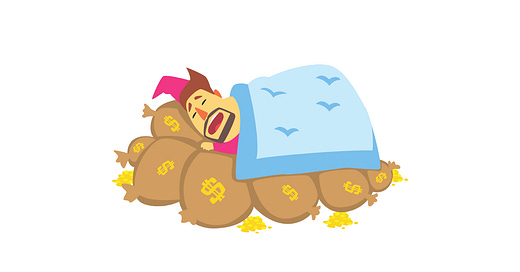Why the fuss around passive investing?
Reading between the lines of changing investing behavior.
They say, “The earlier you start investing, the earlier you can retire and travel the world”.
Aah! You are finally sold to the dream of investment. Now all you want to do is to stash your money in some authentic funds and dream about a trip to Paris.
Uh-huh. Not so easy.
Decision paralysis grips you by the neck. You are trying to find not just one, but multiple good schemes to balance the risks, rewards and your dreams. There are just so many options, claiming to give you good returns. Exhausting, no?
Don’t worry, take a deep breath. You are not the only one. Many people are in the same boat. And to keep this boat afloat, the finance nerds invented the concepts of Index Funds and Exchange Traded Funds (and of course, came in a couple of jargons in the process!)
When it comes to investing in equities, you can go down two paths. You either take matters in your own hands, take all decisions by yourself...
...or, you can down the other path and delegate your hard work. This is what mutual funds are all about. Now, within mutual funds also there are two types of asset managers - those actively trying to beat others (or, beat the market), and those just chilling and trying to get a market-average return (passive).
ETFs and Index Funds fall under the “passive” investment category.
Both ETFs and Index Funds mirror the indices like Sensex and Nifty 50. These indices published by stock exchanges are weighted average stock prices of top companies in India that help assess how the overall economy is doing.
So, the stock markets have already done the hard work to create a portfolio. ETFs and Index Funds have to merely copy those.
“But, they look similar. Why choose one over the other?”
Well, let’s talk money first. Both ETFs and index funds charge a small fee to cover the operational and management costs. This fee is called the expense ratio, and is set at 0.75-1.5% for index funds. ETFs, however, are less expensive, with the expense ratio of only 0.1- 0.5%.
Moreover, ETFs can be purchased throughout the day, during the trading hours and have to be compulsorily listed on a stock exchange. Units of an index fund can be bought only at the end of the day.
So, planning to opt for ETFs?
Wait, don’t take a hurried decision. ETFs have their own set of troubles.
For starters, you need a demat account to purchase an ETF. Remember how ETFs are less expensive than index funds? Well, they can have additional expenses in the name of trading and brokerage charges, which makes them really not less expensive. Also, ETFs are sometimes not available at market rate, making them more expensive than we realize.
Now, let’s keep the cost factor aside and evaluate on other grounds.
ETFs and index funds sometimes also suffer from what is called “tracking error.” Sometimes, the actual returns differ from the returns provided by the indices. You choose these investments because they replicate indices, right? Now, if this isn’t done accurately, won’t you be dissatisfied? So, the tracking error becomes an important criteria to choose any ETF or index fund.
Wait, there’s more.
How about not having to make these investments manually at all? How about automating your investments, just like your automated Netflix subscriptions and bill payments? Imagine.
A fixed amount getting deducted from your account on a regular basis. Your money taking you closer to your goals without you tipping-tapping on the phone to make those investments! That’s what SIP does. And well, ETFs don’t have that option.
Scared?
All forms of investments have some pros and cons. All you need is to be aware of them and choose what’s the best for you. And well, the popularity of ETFs and Index Funds have been skyrocketing globally.
According to data compiled by the Investment Company Institute for the Financial Times, ETFs had $7.71 trillion in assets under management at the end of last year, while index mutual funds had $7.76 trillion. Look - the numbers have climbed dramatically over the years, and have reshaped the investment industry.
But, hey. Don’t take our word for it. We are here to only educate you, the decision-making power stays with you. It’s your hard-earned money, invest it well!
Disclaimers and Gyaan:
The information shared in this document is only for the purpose of educating investors and should not be considered as investment advice.
Investing is a risky game, especially if you don’t know what you are doing.
Don’t take anyone’s word when it comes to investing, unless they are SEBI registered / authorised financial advisors.
Do your own research (and please go beyond the first page of Google Search).
Wanna interact with the creators of these insightful pieces? Join our WhatsApp Channel! (it’s free).








Amazing Article! easy to understand with relatable examples, i would recommend this website to all investing newbies!
Excellent article.
Is there any data that can show us that index funds have performed better than active funds? You haven't explained why is there a surge in index investing??